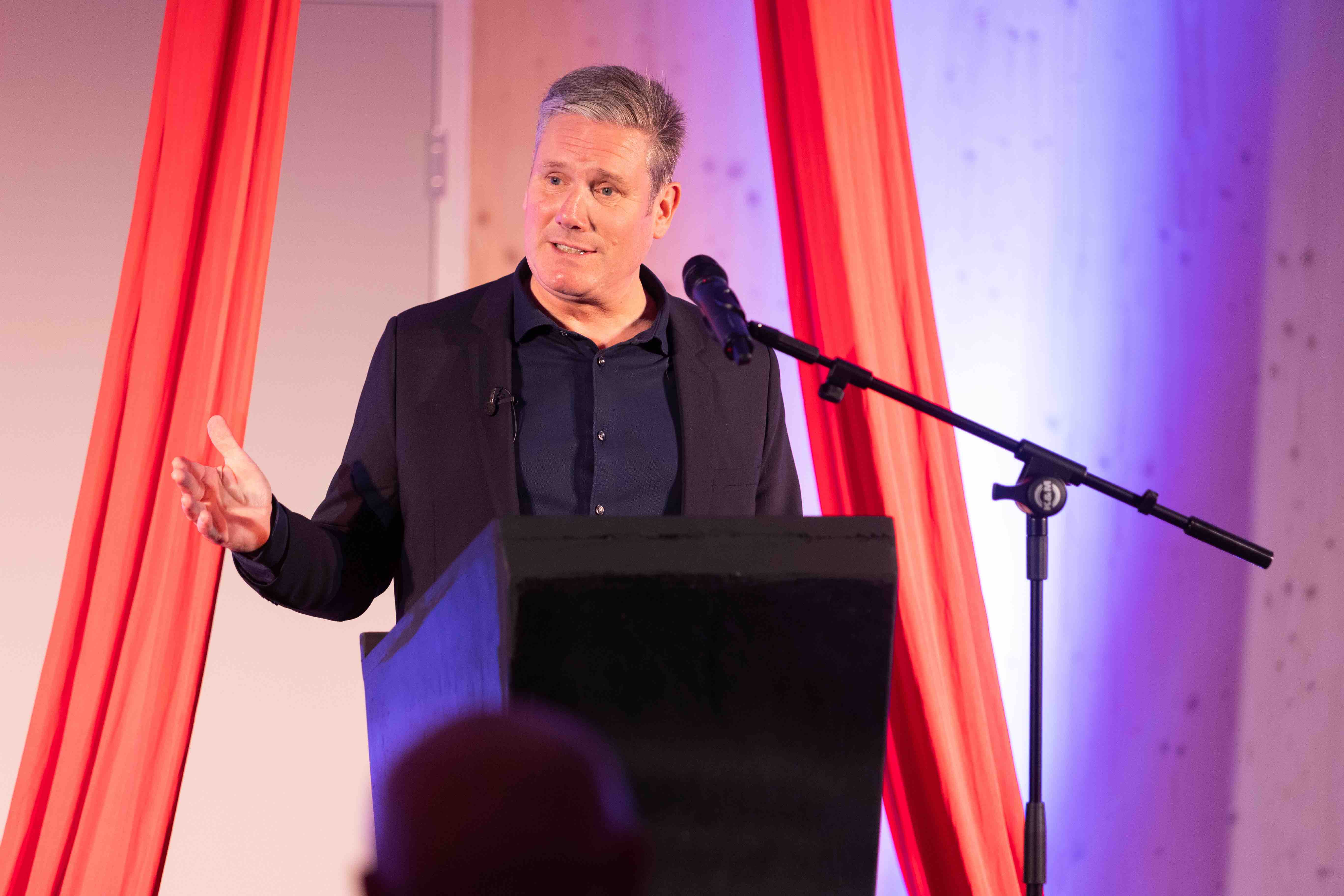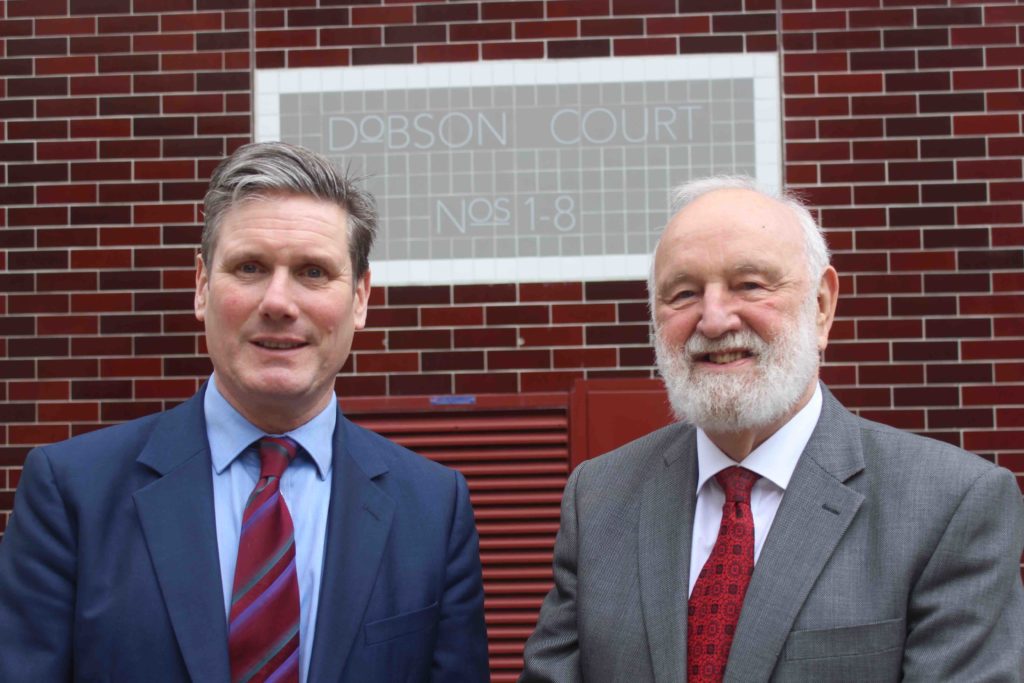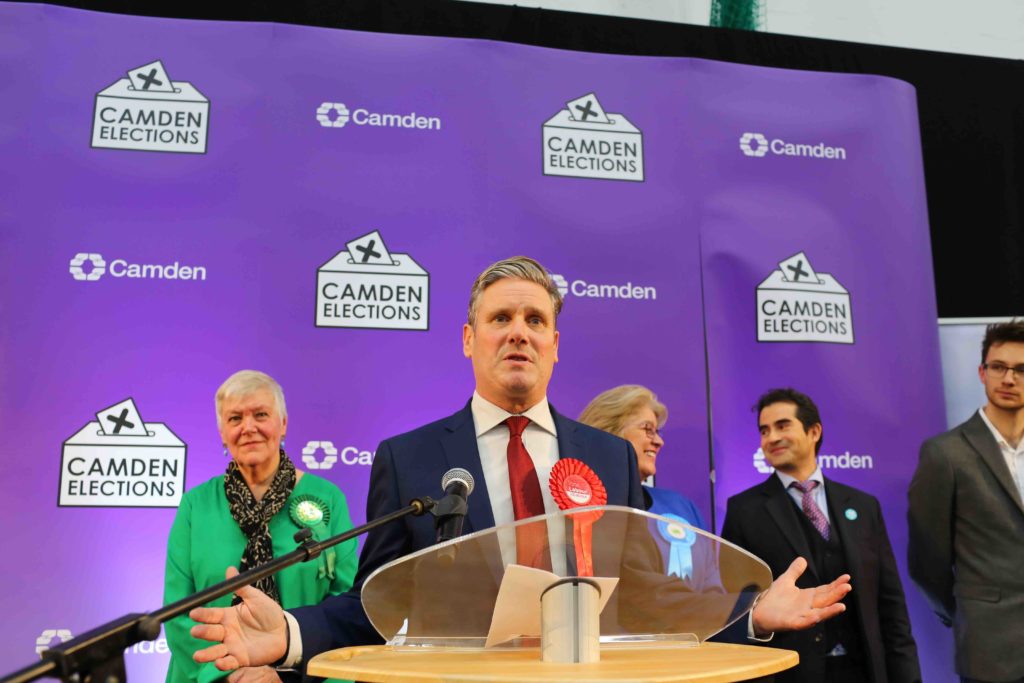£200 million slashed from the council's budget – but will Sir Keir restore the missing money?
Grow the economy first, says Holborn and St Pancras MP
Friday, 26th May 2023 — By Richard Osley

Holborn and St Pancras MP and Labour leader Sir Keir Starmer at the new Roundhouse Works [John Williams]
FOLLOW US ON FACEBOOK. CLICK BANNER.
IT has been the stock response at the Town Hall whenever a painful cut has been made or residents have been told there isn’t enough money for something they feel is desperately needed.
‘If only we had a Labour government, we could do these things’, the frontbench in the council chamber recite.
It’s true that, since 2010, two thirds of the money which once went to Camden has been scissored by the government, a cut amounting to more than £200million.
But after the party’s leader Sir Keir Starmer declared that Labour are now on course to take power at the next general election, will a big cheque be arriving at the doors of local authorities on day one of his administration? Camden, of course, is not the only council or public body which would be holding out its hand.
In an interview with the New Journal, Mr Starmer, the Holborn and St Pancras MP, said he could not get into figures about what councils could expect, and instead told us four times that growing the economy – a mantra of his quest to become prime minister – needed to happen first.
He ruled out a tax-and-spend strategy advocated by some of his predecessors in control of the party and the remaining elements of the party’s left-wing caucus who have seen tax avoidance, evasion and simply not asking for enough as the clue to where the money could be found for public services.
Mr Starmer said: “First, let me acknowledge the problem because I live in the borough – I have lived in the borough for decades – and we’re in daily contact with the council, and I absolutely appreciate how tough it’s been. I think they’ve done a really good job in a really tough set of circumstances.”
He added: “What I hope, if we are privileged enough to win an election, is that we can begin to turn that around. The first thing has to be growing our economy. So before we go to anything else, we’ve got to get more money coming into that economy, because that’s the way to have proper public funding for our services and our councils.”
With a limited number of opposition councillors in Camden’s chamber, the debate over the government’s slashing of council budgets is rarely switched the other way with a question about how far Labour would have matched these cutbacks if it had been in power nationally. Camden is respected in local government circles as good council, but other local authorities teeter on the edge of bankruptcy and it is hard to find a public sector worker who doesn’t have concerns about whether they have the resources needed to do their jobs properly.
Mr Starmer added: “If the economy had been growing in the last 13 years as much as during the last Labour government, we’d have some of that £40billion to spend on our public services, which is not available today. So we’ve got to grow our economy. Obviously we need a better settlement. As to the exact sum, I’m not going to get into that, but I’m acutely aware of the problem of underfunding in our local authorities.”
In technical detail, he said Labour would make “structural changes” so councils knew how much money they would be getting over a longer period rather than a series of short-term settlements.
The same sirens for financial help will no doubt come from Transport for London, who are about to put Kentish Town Underground Station out of action for up to a year for escalator works. Its bosses say there is not enough money to make the Northern Line stop wheelchair accessible in the process, so those needing a step-free service will have to wait until an unknown date, presumably years into the future.
The problems down the road at dangerously overcrowded Camden Town tube station also remain unsolved with a large-scale overhaul kicked into the very long grass amid declared cash constraints.

Sir Keir Starmer with his predecessor in Holborn and St Pancras, the late Frank Dobson
London Mayor Sadiq Khan has often blamed the failure to make upgrades and improvements on the government’s funding settlement. Mr Starmer had the same answer when asked if the next Mayor of London could expect more money if his party take over from the Tories.
“The sort of central mission of an incoming Labour government is to grow the economy and everything hangs off that,” he said. “If we try to tax and spend out of a diminishing fund of money, we’ll just go around in diminishing circles.”
‘Grow the economy’ has a familiar sound to it. Liz Truss – the failed prime minister who spent just 50 days in Downing Street – was known for repeatedly demanding “growth, growth, growth”.Her disastrous mini-budget aiding the wealthiest triggered a fresh crash and monthly mortgage costs to leap.
Mr Starmer has previously dismissed the Tories’ views as “fantasy economics” and said trickle down policies do not work. On the economy, he has said his party would invest to boost productivity – which some critics say is too vague for a policy commitment, but he has pledged an overhaul of the business rates system.
While speaking to the New Journal he added that he was not presumptuous about being the next incumbent of Number 10, but after the Tories surrendered 1,000 seats at the recent local elections elsewhere in the country, he himself publicly declared the party was now on course for a parliamentary majority.
Opinion polls show a commanding Labour lead over the Conservatives. Whatever the date of the next election, the camera crews will be at the count in Holborn and St Pancras like never before to see if the next PM will come from this borough.
“We’re planning but we’re not complacent because there’s a long way to go yet,” Mr Starmer said.
‘It was too expensive to nationalise the energy companies’, says leader
SIR Keir Starmer said his party was not against public ownership of the utilities we all rely on, amid claims that Labour has switched direction, writes Richard Osley.
The party went into the past two elections pledging nationalisation of water, rail and energy, but shadow chancellor Rachel Reeves has said such policies do not “stack up against our fiscal rules”.
The issue of who controls vital services has been drawn into focus by the large-scale profits made by energy companies, compared to a run of eye-watering bills for households across the UK.
“It’s often put to me ‘well, what about energy?’ In the middle of the energy crisis last year, it was obvious that prices were going to go through the roof for people and they wouldn’t be able to afford them, so I therefore asked for options,” Mr Starmer told the New Journal.
“But the test I set for the team was it’s got to lead to a reduction in the bills that are coming through people’s doors. We looked at public ownership of energy and the answer came back, of course, it’ll cost a lot of money and even a public-owned energy company would still have to buy from the global market.”

The next general election count in Holborn and St Pancras will attract huge media attention
He added: “It wouldn’t be possible to pass on any reduction in bills to people who at that stage were facing bills of £3,500. For that reason, we had to take a pragmatic decision, that it would be better to have a windfall tax on oil and gas companies, on their profits that they didn’t expect to make and use that to reduce bills.
“And not to buy energy companies, which would mean we’re paying off shareholders rather than reducing bills. So some of these are just pragmatic decisions that we have to make in the circumstances that we find ourselves in.”
But Mr Starmer said the party remained committed to last autumn’s conference announcement that Labour would create a public-owned energy company.
“Anyone who says we’re not interested in public ownership needs to remember that GB Energy is going to be a big feature,” he said.
There had been suggestions that Labour would nationalise rail service and the water supply – with companies in both fields facing questions over the quality of their services. But Labour last summer said it would now not be looking at nationalisation.


